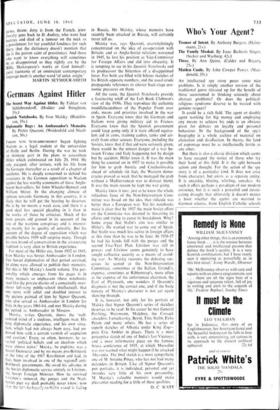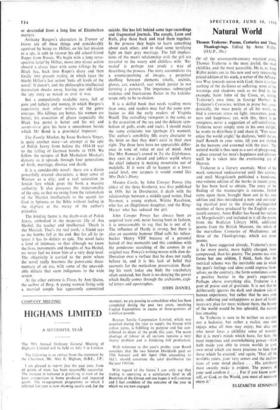Who's Your Agent?
AN intellectual spy story poses some nice problems. Is it simply another version of the traditional genre titivated up for the benefit of those accustomed to thinking seriously about abstract problems? Or does the political- religious syndrome deserve to be treated with genuine respect?
It could be a rich field. The agent or double agent working for big money and employing any means to achieve his ends is an obvious pivot for debates on loyalty and personal behaviour. In the background of the spy's biography is a whole archive of material on alienation and disaffection. In theory, the land of espionage must be as intellectually fertile as any other.
But there is also a classic division which seems to have escaped the notice of those who try their hand at this field. It is the split between action and thought. For the action of the spy story is of a particular kind. It does not arise from character, but exists as a separate entity. It is anarchic, blazing, whirling, senseless. As such it offers perhaps a paradigm of our modern existence, but it is such a powerful and intoxi- cating draught that ultimately it doesn't matter a hoot whether the agents are married to German whores, from English Catholic schools or descended from a long line of Elizabethan martyrs.
Anthony Burgess's characters in Tremor of Intent are all these things and considerably agonised by being so. Hillier, on his last mission as a spy, is sent to recover his old school-friend Roper from Russia. We begin with a long retro- spective lettef by Hillier, move into direct action aboard a classy liner with some killings by the Black Sea, back into Roper's diary and then finally into present reality, in which (says the blurb) Hillier's last action 'links all levels of the novel.' It doesn't, and the philosophic-intellectual decoration shucks away, leaving our old friend the spy story as naked as ever it was.
But a compulsively readable story, full of gore and lechery and money, in which Burgess's superiority over other writers of the genre emerges. His killings are better, his women are better, his evocation of places (especially the Black Sea ports) •is better and his wit and savoir-vivre give his hero a smoothness beside which Mr Bond is a provincial impostor.
The Family Moskat, by Isaac Bashevis Singer, is quite another story—an attempt at the epic of Polish Jewry from before the 1914-18 war to the falling of German bombs in 1939. We follow the octopus of Reb Meshulam Moskat's dynasty as it spreads through four generations of birth, marriage, divorce and death.
It is a considerable novel: there are a dozen powerfully created characters; a deep sense of Warsaw as a city; and a real saturation in Jewish lore which gives the book a massive authority. It also possesses the impersonality of the epic, so that we swing from the rationalism of the Marxist intellectuals to the search for God in Spinoza or the Bible without feeling in the slightest at the mercy of the author's prejudice.
The binding theme is the death-wish of Polish Jewry, embodied in the desperate life of Asa Heshel, the teacher and intellectual. 'Death is the Messiah. That's the real truth,' a friend says as the bombs fall at the end. But for,all its in- terest it has its defects as epic. The novel lacks a kind of intimacy, so that although we know the lives, movements and thoughts of Asa Heshel, we never feel we know him at a very deep level. The objectivity is carried to the point where the novel really becomes the panoramic docu- mentary of an era, with some of the unavoid- able defects that seem indigenous to the wide screen.
At the other extreme is Three, by Ann Quinn, the author of Berg. A young woman living with a married couple has apparently committed suicide. She has left behind some tape-recordings and fragmented journals. The couple, Leon and Ruth, play these back and read them together. In the process they begin to learn something about each other, and to shed some terrifying light on their grey marriage. The full implica- tions of the man's relationship with the girl are revealed to the weary and childless wife. 'Re- vealed' is perhaps too crude a way of describing the process. The story accumulates via a counterpointing of images, a perpetual shuffling between elements (shells, orchids, gloves, cat, cockerel, sea) which persist in not forming a pattern. The impotence, submerged violence and frustrations flicker in the kaleido- scope only to be re-shaken.
It is a skilful book that needs reading more than once, and readers may feel the same con- fusion as did the early readers of Virginia Woolf. The swivelling viewpoint is the same, as is the evocation of the sea and the delicate sym- bolism of gulls, crabs and rocks. I should make the same criticisms too (perhaps it's women). The author's sensibility fills every character to the brim so that they don't exist in their own right. The three here have no appreciable differ- ence in tone of voice or cast of mind. And like Mrs Ramsey's crowd in To the Lighthouse, they exist in a closed and jobless world where the chief industry is making mountains out of molehills. If it were all to happen at a lower social level, one suspects it would sound like Mrs Dale's Diary.
Maiden Castle, by John Cowper Powys (the eldest of the three brothers), was first published in 1936. Set in Dorchester, it deals with the relationships between a middle-aged writer, Dud No-man, a young orphan, Wizzie Ravelston, who has an illegitimate daughter, and the Ring- Master who has seduced the girl.
John Cowper Powys has always been an acquired taste and, never having been in fashion, it is unreasonable to say that he is out of it. The influence of Hardy is strong, but there is also an eccentric humour (Dud calls his refuse- bucket 'Henry VIII' because of a personal hatred of that monarch) and this combines with the ponderous searching of the cosmos in an original way. PoWys's writing moves with slow de- liberation over a surface that he does not really believe in, and it is this lack of belief that accounts for the meticulous preservation. Read- ing his work today one finds the vocabulary often outdated, but there is no denying the power which finally comes through the archaisms, capi- tal letters and apostrophes.
JOHN DANIEL



































 Previous page
Previous page